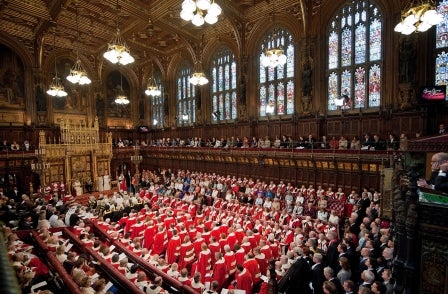
Lord Puttnam’s bid to attach a Leveson law to the Defamation Bill will go down in history as an act of “infamous foolishness” if it ends up scuppering the bill altogether as many fear.
This was the warning issued by City University head of journalism George Brock at a lecture at Gresham College in London this week.
The Defamation Bill goes for its third and final reading at the House of Lords on Monday.
And if Puttnam’s Opposition amendment cannot be dropped at this stage it appears likely the Government will drop the bill altogether rather than risk his “Draconian version" of the Leveson recommendations becoming law.
Brock said: “This an area of messy chaos which favours people with agendas which might not be popular if everybody caught on to what they were doing…
“The libel bill is the culmination of at least three years' work in Parliament and 15 years of work and discussion, it is on the brink of going through…
“Puttnam's manoeuvre puts the entire libel bill at risk…if the libel bill goes down the cleverness of his ambush will I hope be forgotten and the destruction of a valuable reform will be seen as a moment of infamous foolishness – as we will have lost a great deal more than we would have gained.”
The Puttnam amendment was passed by 272 votes to 141 on 5 February and provides for the creation of a libel arbitration body under a new press regulator.
Controversially, journalists who did not consult the new regulator in advance of publication would leave themselves open to the risk of exemplary damages in libel and privacy actions.
Brock noted that Puttnam’s amendment goes further than Leveson and that the only European nations to have such regimes are those that were formerly part of the Soviet Union.
The Defamation Bill proposes great protection for investigative journalism with a new "public interest" defence and and also states that claimants must show "serious harm".
Brock also used his lecture, entitled 'Leveson Inquiry: Trauma or Catharsis', to criticise the Conservative party’s proposal for a press regulator underpinned by Royal Charter.
Brock noted that legislation would still be needed to make the Royal Charter system work and questioned how independent it would be.
“The Royal Charter can be tampered with by the Privy Counci, that means the Cabinet can change it. That seems to me weaker as a defence than legislation might be.”
He also suggested that the Royal Charter system would provide for a “watered down” version of Leveson.
He said: “From the little we have from the owners so far it looks like the representatives of the papers have watered down the independence of the regulator.
“Leveson said that the new regulator's chair and board should be appointed ‘Without any influence from the industry or the government’. The current draft says without any direction from the industry or the Government. Does that suppose power of veto. We don't know.”
George Brock's Gresham College Lecture can be listened to in full here.
More information on the Defamation Bill is available here.
Email pged@pressgazette.co.uk to point out mistakes, provide story tips or send in a letter for publication on our "Letters Page" blog
